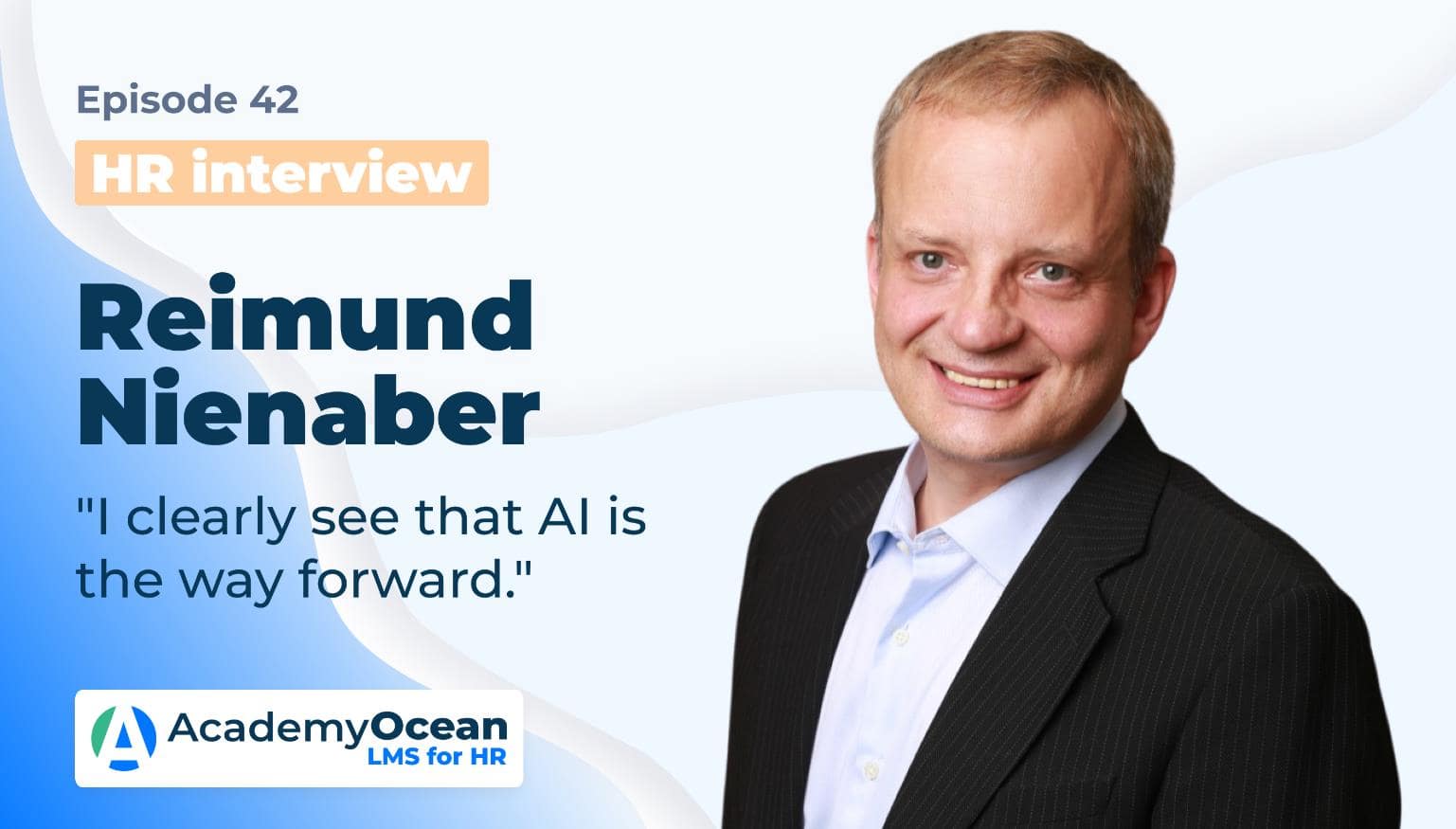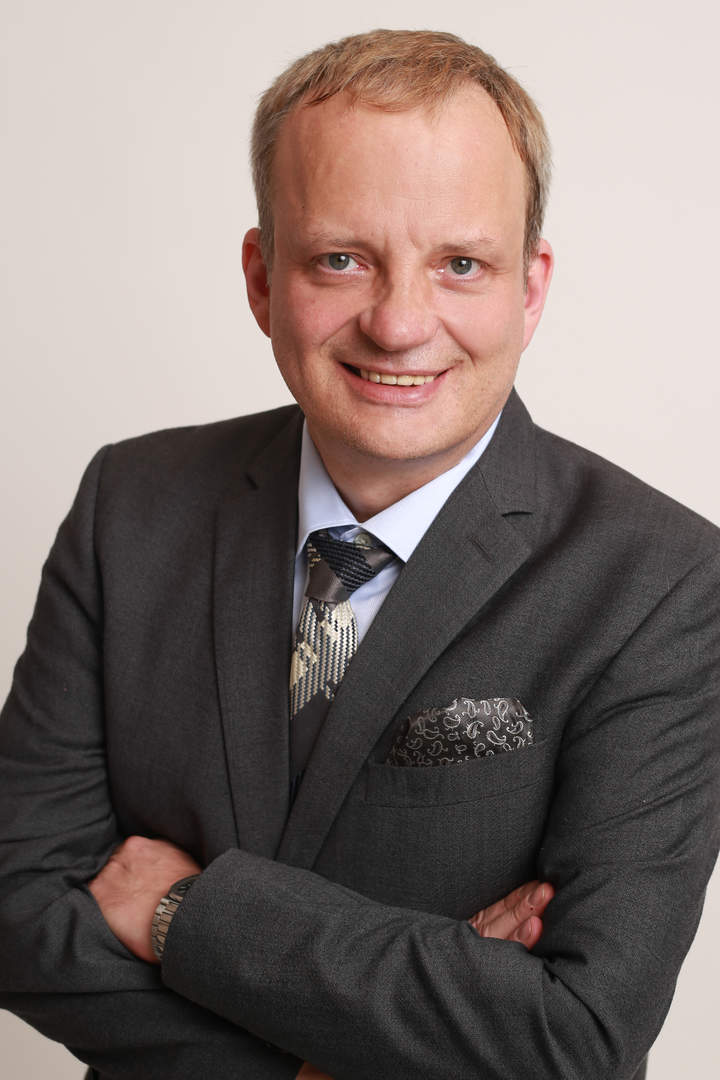Reimund Nienaber: "I clearly see that AI is the way forward"

📌 In this interview, we'll talk about the areas in which AI can be used in HR, whether it can completely replace human labor, and much more...
Today our guest is a specialist with more than 25 years of experience at HR Reimund Nienaber.
Let's get to know him better!

Reimund is a Senior HR leader and generalist with profound hands-on global leadership capabilities, expertise and business acumen, innovating 15 years in human resources and 17 years in technical and managerial roles with commended performance and proven result.
He has over 20 years of experience in the telecommunications industry, most of which he spent at Nokia as HR Business Partner and later Head of HR and Senior Director of HR.
At Nokia, Reimund led the HR Business Partner program for global teams and divisions of up to 5,000 employees in 49 countries, providing strategic leadership for talent development, succession planning, employee recognition and incentives.
He is now Thought Leader Talent Analytics & Learning Analytics at EDLIGO.
EDLIGO is a technology company that provides organizations around the world with AI-assisted learning and talent analytics.
So let's start our interview!
AO: Reimund, how did you get into HR? What was the starting point?
Reimund: Thank you for the questions. I started my career as an electrical engineer and was rather on the technical road. Not long in the job, I saw myself managing engineers in the Asia Pacific region. I enjoyed seeing them grow and discovered my enthusiasm for talent, competence and learning management. Soon, I became responsible for really large teams across Asia and evangelized the best management work practices like regular 1on1s. It’s important to know your people!
After moving from Asia to Latin America, I continued to build great teams on the other side of the planet. At that time, the now CHRO of Nokia, Stephanie Werner, connected with me and asked if I would like to move to HR as global HR Business Partner in Munich. We were facing a huge merger with Siemens, and big cultural change activities needed to be led throughout large organizations. I did not think much and welcomed the offer to join HR and never regretted this step.
AO: Great, we bet you have a huge amount of experience in building and managing teams.What is the main thing in building a responsive workplace culture?
Reimund: The most important thing here is simple and difficult at the same time. It is trust. We all know: Trust needs to be earned and is easily lost. The entire organization and all management levels must have a strong commitment to agreed corporate behaviors. An agreed culture with its values must be always valid. Especially during tough times. When there is trust and a good manager, then employee relationships can be built. Valuable time is spent in frequent 1on1s. This way trust can be developed on all levels and people are not scared or intimidated when speaking up.
People and organisations are at their best when they can speak up and contribute and feel heard and safe at the same time.
AO:What are the 3 main factors in your opinion for the formation of effective teams?
Reimund: A lot has been written about how to create effective teams. Often, teams have to be small. Resources are scarce. We do not have the luxury of duplication of skills but see all needed skills covered.
Secondly, you want to create a psychological safety zone that all can speak up and develop trust. This will be achieved through good communication.
As a 3rd factor, I see interpersonal sensitivity and dependability. Without those, a team does not move the needle. With these, you have a great starting point for great performance.
AO:How to build a successful newbie onboarding process?
Reimund: This is not said with a few words. Onboarding starts before the newbies start working for you. This is often forgotten. Thus, newbies have been lost before they even start officially.
One must have people dedicated to onboarding in any organization and understand the needs. Understand what is to be done to get new employees productive quickly. Not to forget how to make sure that they really show up on the first workday!
Onboarding people is much more than experience management these days. Competition for the best is out there. And we all know that there is no chance for a second first impression.
Hence, good talent and learning management from the start. Development plans according to company and individual needs must be ready for deployment in time.
AO:What technologies in employee training, and in HR in general, is the future behind?
Reimund: Development of employees cannot stop. It is imperative for companies as they want to grow. For employees, it is the motivation that needs to be stimulated through good tools, learning and talent management experience.
During the pandemic, we had to rethink how we get new competence to people. As HR, we support the business to identify future strategic competencies and provide access to learning platforms. Managers lose oversight quickly and require great tools for learning and talent analytics.
Competence management, talent management or learning management cannot be done any more on a simple spreadsheet.
Good ideas and data are often already available, but managers do not know how to access or link those. Having such big data in front of them, help is needed in how to read the data and how to interpret it.
In my view, the future is clearly going towards artificial intelligence driven data and decision support management.
Talent and learning analytics and automated interpretation that is made available to management, HR and employees. All will benefit moving towards this path.
AO:In what areas of HR do you think AI can be used and how?
Reimund: This is a question and area I'm very enthusiastic about. Still, a lot of thought leadership is needed in organizations when it comes to evangelizing artificial intelligence in the talent and learning space. But not only there I see AI applications. We see AI in HR helpdesk bots already working in various organizations. Allowing HR staff to focus on value adding and strategic activities.
I clearly see that AI is the way forward.
Too many managers only have a hunch and no facts or little facts when making decisions. This is not good for any organization.

The right AI system helps managers in all organizations to stop the guesswork in learning and talent management with efficient talent analytics data platforms and an AI engine that provides recommendations about training and learning plans, recommendations about who is the best to fill a project position or even who would be the right person to promote.
Important to know that this AI technology is already available. It has become real with the EDLIGO software of Education4Sight I work now with. AI provides you with clear recommendations on who to promote, who to place on what training or what development path. It is an eye-opener to those using that AI system, and there are great reference projects and customers.
AO:What is the role of data in HR decision-making? How do you approach using analytics to optimize your workforce?
Reimund: Data is key for making decisions. Many companies are discovering this as they see competition moving ahead, and they feel left behind.
Any organization should make use of talent and learning analytics software. This is already standard for many organizations.
The information HR and others are getting from the data is eye-opening and allows making the right decisions in terms of mobility and promotions or staff adjustment having organizational future in mind.
Analytics only, however, is not enough anymore. A smart AI system helps us find the needle in the haystack we have been searching for.
AI comes as the helping hand in workforce decision management and is the ultimate “cool”. Efficient HR decision management will not happen without artificial intelligence support.
AO:In your opinion, will technology in the future be able to completely replace human labour in HR analytics or other areas?
Reimund: Self-learning AI systems will help us to make decisions based on the data that the AI system finds. This technology will help us manage and sort the big data that is created, stored and available for productive use.
Final decisions will and must always stay with humans. But AI technology has made big leaps to help HR and managers with their work and will continue to do so.

I trust that we are just seeing the outer peel of what AI is going to provide to humanity in the future.
AO:What are the best ways to create and maintain a culture of feedback?
Reimund: NO workplace can survive without a feedback culture. The regular interaction between manager and team in a trust environment is the best way to encourage feedback, should it be positive or negative.
My recommendation is to stay with regular short 1:1 meetings. This helps to create and maintain trust and is easy to implement for any manager and any level in an organization.
This way, one creates time for feedback. A precondition for it to happen at all. In the right culture, we can always give and receive feedback.
AO:Could you share the most difficult task and the most successful situation that you have faced in your professional life?
Reimund: In HR there are always new great challenges. As people are different and HR deals with people, no challenge or person is the same. I always find it difficult to run restructuring programs in organizations. However, respect towards the work and the people help to design processes to do things in fair and in accommodating ways. When people through good development programs are making great steps in their career, these are the moments of pride and success celebration.
AO: Unfortunately, the interview is coming to an end...
Reimund, do you have mentors or inspirations in life and in your professional career?
Reimund: Especially in HR, you find thought leaders like Dave Ulrich that pave the way for new thinking that continually inspires me. Certainly, I had mentors that helped me to become what I am and do. Grateful for all the learning and continuous feedback through time.
AO: Wow, thanks, Reimund, that was a very exciting conversation and inspiring interview!
Well, friends, we are happy to share new ideas with you so that you can apply them to improve training and talent analysis. Share with colleagues and those who may be interested.
😉 Stay in touch!


